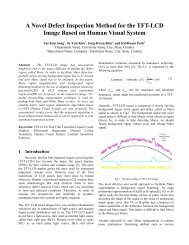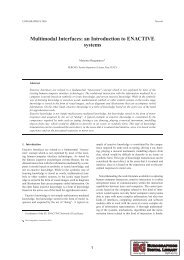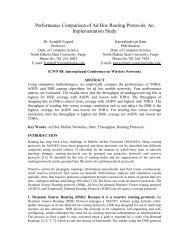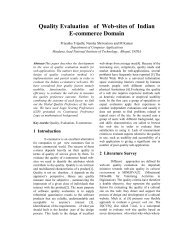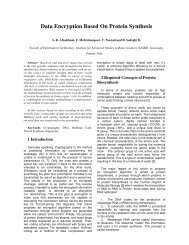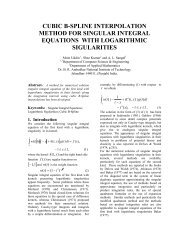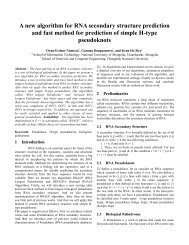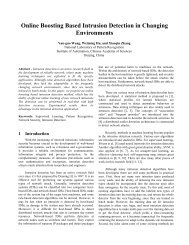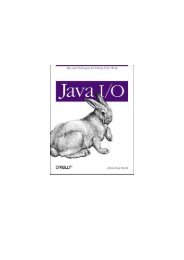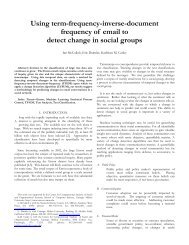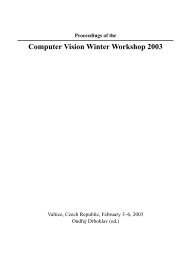O'Reilly - Java Message Service
O'Reilly - Java Message Service
O'Reilly - Java Message Service
You also want an ePaper? Increase the reach of your titles
YUMPU automatically turns print PDFs into web optimized ePapers that Google loves.
}<br />
public void setInt(String name, int value)throws JMSException;<br />
public long getLong(String name) throws JMSException;<br />
public void setLong(String name, long value) throws JMSException;<br />
public float getFloat(String name) throws JMSException;<br />
public void setFloat(String name, float value)<br />
throws JMSException;<br />
public double getDouble(String name) throws JMSException;<br />
public void setDouble(String name, double value)<br />
throws JMSException;<br />
public String getString(String name) throws JMSException;<br />
public void setString(String name, String value)<br />
throws JMSException;<br />
public Object getObject(String name) throws JMSException;<br />
public void setObject(String name, Object value)<br />
throws JMSException;<br />
public Enumeration getMapNames( ) throws JMSException;<br />
public boolean itemExists(String name) throws JMSException;<br />
A.1.10 <strong>Message</strong><br />
<strong>Java</strong> <strong>Message</strong> <strong>Service</strong><br />
The <strong>Message</strong> interface is the super interface for all message types. There are six messages<br />
types including: <strong>Message</strong>, Text<strong>Message</strong>, Object<strong>Message</strong>, Stream<strong>Message</strong>, Bytes<strong>Message</strong>, and<br />
Map<strong>Message</strong>. The <strong>Message</strong> type has no payload. It is useful for simple event notification.<br />
A message basically has two parts: a header and payload. The header is comprised of<br />
special fields that are used to identify the message, declare attributes of the message, and<br />
provide information for routing. The difference between message types is determined<br />
largely by their payload, which determines the type of application data the message<br />
contains:<br />
public interface <strong>Message</strong> {<br />
public void acknowledge( ) throws JMSException;<br />
public void clearBody( ) throws JMSException;<br />
public Destination getJMSDestination( ) throws JMSException;<br />
public void setJMSDestination(Destination destination)<br />
throws JMSException;<br />
public int getJMSDeliveryMode( ) throws JMSException;<br />
public void setJMSDeliveryMode(int deliveryMode)<br />
throws JMSException;<br />
public String getJMS<strong>Message</strong>ID( ) throws JMSException;<br />
public void setJMS<strong>Message</strong>ID(String id) throws JMSException;<br />
public long getJMSTimestamp( ) throws JMSException;<br />
public void setJMSTimestamp(long timestamp) throws JMSException<br />
public long getJMSExpiration( ) throws JMSException;<br />
public void setJMSExpiration(long expiration) throws JMSException;<br />
public boolean getJMSRedelivered( ) throws JMSException;<br />
public void setJMSRedelivered(boolean redelivered)<br />
throws JMSException;<br />
public int getJMSPriority( ) throws JMSException;<br />
public void setJMSPriority(int priority) throws JMSException;<br />
public Destination getJMSReplyTo( ) throws JMSException;<br />
public void setJMSReplyTo(Destination replyTo) throws JMSException;<br />
public String getJMSCorrelationID( ) throws JMSException;<br />
public void setJMSCorrelationID(String correlationID)<br />
throws JMSException;<br />
public byte[] getJMSCorrelationIDAsBytes( ) throws JMSException;<br />
public void setJMSCorrelationIDAsBytes(byte[] correlationID)<br />
throws JMSException;<br />
public String getJMSType( ) throws JMSException;<br />
public void setJMSType(String type) throws JMSException;<br />
146



